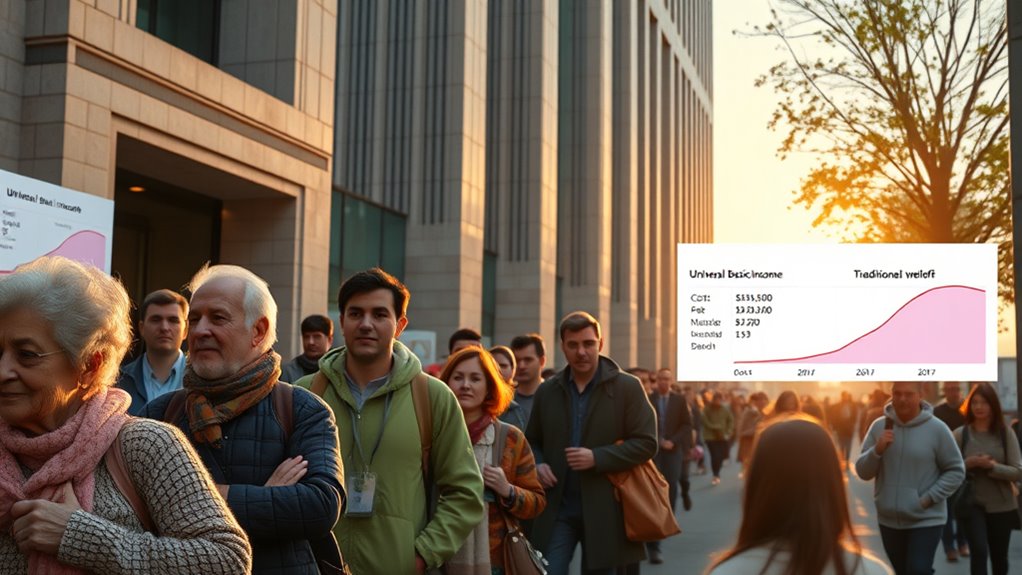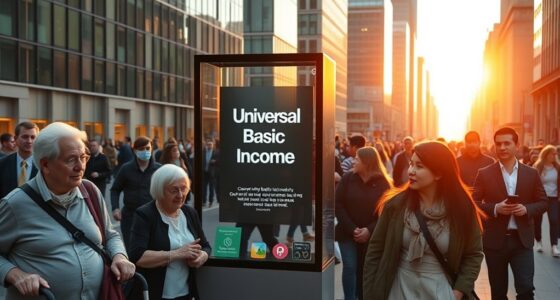Universal Basic Income (UBI) gives everyone a simple, unconditional cash amount, unlike traditional welfare programs that are complicated, tied to specific needs, and often hard to access. UBI can reduce poverty quickly and promote societal wellbeing by providing financial security for all. Although challenging to fund and implement, it encourages economic participation and equality. To see how UBI compares with traditional welfare and why it might be a game-changer, keep exploring further.
Key Takeaways
- Universal Basic Income (UBI) offers unconditional payments to all, reducing stigma and bureaucratic complexities compared to targeted traditional welfare.
- UBI simplifies aid delivery, minimizes administrative costs, and ensures consistent support regardless of employment or income status.
- Traditional welfare programs often involve complex eligibility rules and paperwork, leading to underutilization and inefficiencies.
- Giving money to everyone promotes social inclusion, reduces poverty, and encourages economic participation without disqualifications.
- UBI provides a safety net during economic fluctuations, fostering stability and autonomy better than the often conditional traditional welfare system.
Comparing the Scope and Simplicity of Welfare Programs

Traditional welfare programs like Medicaid, Medicare, and Food Stamps cover a large portion of the U.S. population, but their complexity can make access difficult. For example, Medicaid alone enrolled nearly one in four Americans in 2022, with over 80 different programs addressing various needs. Enrollment numbers reveal that millions rely on these benefits, yet navigating the eligibility criteria and application processes can be overwhelming. Many programs have intricate rules, require extensive paperwork, and often overlap, adding to the confusion. This complexity can discourage eligible individuals from applying or cause delays. Managing multiple programs increases administrative costs and creates barriers to support. Overall, while these programs reach many, their layered structure and bureaucratic hurdles hinder straightforward access. Welfare spending in 2022 exceeded $1.6 trillion, highlighting the extensive resources involved in these complex systems. Additionally, the administrative burden of managing numerous programs can divert resources away from direct aid.
Cost Efficiency and Funding Challenges

Implementing Universal Basic Income (UBI) faces significant cost and funding challenges that can hinder its adoption. You’ll need to examine the massive expenses involved, which vary depending on the scheme’s generosity—from around £274.4 billion for a modest plan to over £677.5 billion for an extensive one. While UBI could reduce administrative costs by consolidating benefits, funding remains a core issue. You might explore options like redistributing existing welfare budgets or introducing new taxes, but these come with political and economic hurdles. Additionally, the high initial costs, ongoing sustainability concerns, and the challenge of efficiently targeting support make funding complex. The total cost of implementing UBI depends heavily on the payment level and scope, and balancing the broad coverage of UBI with fiscal responsibility is a key challenge in making it a viable alternative to traditional welfare programs.
Impact on Poverty and Societal Wellbeing

Universal Basic Income (UBI) markedly reduces poverty by providing unconditional income, ensuring that more people have the resources to meet their basic needs. Because it’s universal and doesn’t require means testing, UBI reaches everyone, including vulnerable groups like children and the elderly, often more effectively than traditional welfare. Studies show UBI can cut poverty by more than half without increasing public costs. It also improves mental health by reducing financial stress and stigma associated with welfare. With predictable, stable payments, recipients gain financial security and autonomy, enabling better planning and investment in their futures. Unlike traditional welfare, which often involves bureaucratic hurdles and conditionalities, UBI fosters social inclusion and cohesion. Additionally, essential oils are sometimes used to promote relaxation and stress relief, which can support overall wellbeing in vulnerable populations. Furthermore, technology-driven automation is transforming business operations, emphasizing the importance of social safety nets like UBI to adapt to economic shifts. Overall, UBI’s direct approach benefits societal wellbeing by alleviating poverty and promoting stability.
Economic Effects and Incentives to Work

Providing unconditional income through UBI influences the economy in several ways, especially regarding spending behavior and work incentives. With more disposable income, you’re likely to spend more, boosting demand and economic activity. However, UBI may also reduce the overall work effort, as some recipients feel less need to work. This can lead to:
- Increased consumption, stimulating the economy
- Reduced labor supply, potentially shrinking the workforce
- Higher taxes needed to fund UBI, which might discourage work
- Lower savings rates, affecting capital accumulation
- Potential macroeconomic stability depending on balancing spending and labor effects
While UBI can make the economy more dynamic through increased spending, it also risks decreasing incentives to work, which could slow economic growth and reduce productivity. Long-term effects on labor supply are complex and depend on various factors, including the design of the UBI program and the existing economic context. Additionally, labor market dynamics may shift as some individuals choose to reduce their working hours or exit the workforce altogether. Understanding personal finance management principles and behavioral economic insights can help individuals navigate such economic changes effectively. Moreover, the color accuracy of economic indicators plays a role in assessing the true health of the economy during such transitions. Recent research into AI security vulnerabilities highlights the importance of robust safety measures to maintain trust in technological advancements that influence economic stability.
Practicalities of Implementing Universal Basic Income

While the idea of a universal basic income offers promising benefits, putting it into practice involves overcoming significant systemic and administrative hurdles. Scaling pilot programs is tough, as they show promise but face challenges in reaching all eligible individuals. The “benefits cliff effect” complicates things since UBI payments can reduce eligibility for existing aid like SNAP or Medicaid, requiring complex waivers and coordination across agencies. Implementing UBI also demands a robust infrastructure for regular cash transfers, population registries, and fraud prevention. Designing policies that prevent stacking issues and guarantee no one loses out is vital. Additionally, integrating UBI into current welfare systems adds layers of bureaucracy, requiring careful planning to avoid duplication and inefficiencies. These complexities make widespread implementation a significant logistical challenge. Furthermore, understanding the AI Bifurcation helps inform policymakers on how technological shifts might impact the design and scalability of UBI systems in the future. It is also important to consider administrative challenges such as managing large-scale data and ensuring equitable access, which are essential for successful deployment. Developing effective administrative procedures can help streamline processes and reduce costs, making UBI more feasible at scale. A public acceptance of UBI is necessary, which involves addressing societal perceptions and potential resistance. Moreover, ongoing assessment and feedback mechanisms are necessary to adapt programs efficiently as they expand.
The Broader Social and Economic Implications

Implementing UBI can profoundly reshape society by promoting greater inclusion and equality. It helps reduce poverty more effectively than traditional welfare by providing everyone with a basic income. UBI simplifies benefits, cutting administrative costs and streamlining support systems. It promotes equality by narrowing income gaps and enhances personal freedom, allowing you to pursue activities you value without financial stress. Additionally, UBI encourages economic participation, fostering entrepreneurship and local spending. Incorporating wall organization systems into home decor can also symbolize the importance of structure and support in fostering social stability. Moreover, integrating innovative planter designs can serve as a metaphor for growth and resilience within a community. As seen in Honda Tuning, customizing and optimizing systems can lead to improved performance and efficiency, much like how social systems benefit from thoughtful enhancements.
Frequently Asked Questions
How Does UBI Affect Long-Term Economic Stability?
You might wonder how UBI affects long-term economic stability. It can boost stability by reducing poverty, smoothing consumption during shocks, and encouraging human capital development. However, it may also pose challenges like funding difficulties, reduced labor supply, and resource allocation issues. Overall, UBI has the potential to promote sustainable growth, but you should consider its financial sustainability and possible impacts on productivity and the job market over time.
What Are the Potential Risks of Universal Income Disincentives?
Think of disincentives as hidden weeds in your garden. With universal income, you might find yourself working fewer hours or quitting jobs because the safety net feels like a cushion too comfortable to leave. This can lead to less productivity, longer unemployment, and dependency. While UBI offers security, these risks could slow economic growth and reduce motivation, making it essential to design policies that balance support with encouragement to work.
How Do Political Ideologies Influence UBI Implementation?
You see, political ideologies play a big role in how UBI gets implemented. Supporters like liberals and socialists push for it as a way to reduce inequality and empower individuals. Conversely, conservatives and many Republicans oppose UBI, citing concerns over government control and financial sustainability. Your views on government intervention and economic policy influence whether you see UBI as a helpful solution or a problematic idea.
Can UBI Replace All Existing Social Welfare Programs?
You wonder if UBI can replace all social welfare programs. In reality, replacing targeted programs with UBI is challenging because it demands enormous funding and faces political opposition. While UBI could simplify support and reduce poverty, it might not meet everyone’s specific needs. You might find that UBI works better as a supplement, rather than a full replacement, ensuring vulnerable groups still receive necessary assistance.
What Are Successful International Examples of UBI Policies?
You’ll find that successful international UBI policies, like Namibia’s pilot reducing malnutrition and Kenya’s ongoing program boosting food security, show positive impacts. Finland’s trial improved well-being despite no employment boost, while India’s project enhanced health and education. These examples, funded by donors or governments, demonstrate UBI’s potential to reduce poverty and improve lives. While outcomes vary by context, these pilots highlight UBI’s promise in diverse settings.
Conclusion
So, when you consider giving everyone a basic income, it’s not just about simplicity or cost. It challenges traditional ideas about work and support, suggesting that unconditional cash could reduce poverty and boost societal wellbeing. But does it truly encourage work or lead to economic decline? The truth is, UBI’s impact depends on how you implement it. By exploring this, you can decide if universal cash is the future or just a bold experiment worth watching.









